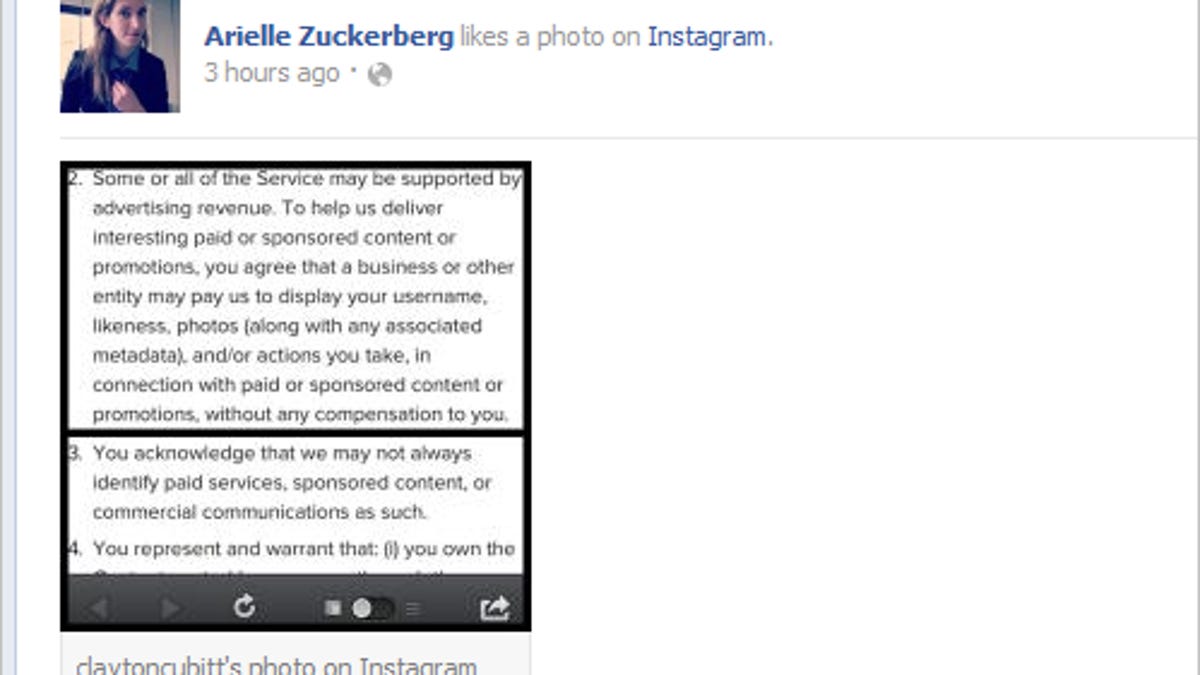Instagram rivals try to lure users away after photo rights flap
Instagram's competitors including Flickr, Blipfoto, and 23snaps are hoping to lure users by promising to do more than Facebook to respect photographers' rights.

Instagram's competitors are pouncing on the company's claim that it will be able to sell users' photos for advertising purposes without payment or notification.
They're hoping that irritation over Instagram's controversial decision -- which came three months after Facebook completed the acquisition -- will lure users away from the popular photo-sharing app, which passed the 100 million user mark in September.
"We will certainly do our best to make sure that Instagram users are aware of 23snaps as an alternative service," Meaghan Fitzgerald, head of marketing for 23snaps, a London-based company that makes an iOS and Android photo-sharing app, told CNET today.
Yahoo today pointed to its blog post titled "At Flickr, your photos are always yours." Ellen Cohn, a Yahoo spokeswoman, said: "We are seeing strong interest in our recently enhanced Flickr for iPhone app and hope our users continue to enjoy sharing photos with family, friends and the world."
Blipfoto, a daily photo journal, said today it charges a "small annual subscription" instead of trying to monetize user photos itself. "That's why Blipfoto wouldn't sell your pictures to any third parties," Blipfoto's Ryan Mullen said in e-mail.
No other major photo-sharing service appears to have language as broad as Instagram's, which claims the perpetual right to license users' photos to companies or any other organization, including for advertising purposes, which could effectively transform the Web site into the world's largest stock photo agency. A hotel in Hawaii, for instance, could write a check to Instagram to license photos taken at its resort and use them for advertising purposes.
"That effectively guts the user's control over the use and exploitation of the photo," says Daniel Schaeffer, an attorney with Neal & McDevitt, a boutique law firm in Northfield, Ill., specializing in intellectual property. "The most obvious and immediate example is the ability to allow businesses to use your photos in advertising, but the actual effects could be even farther-reaching."
Google's policy, by contrast, is far narrower and does not permit the company to sell photographs uploaded through Picasa or Google+. Its policy generally tracks the soon-to-be-replaced Instagram policy by saying: "The rights you grant in this license are for the limited purpose of operating, promoting, and improving our services." Google also now owns Instagram competitor Snapseed.
In 2007, Yahoo had a licensing flap of its own when its "brand portal" for the Nintendo Wii used Flickr images without permission, but it backed down soon after. Yahoo's policies for Flickr are now very photographer-friendly, saying the company can use the images "solely for the purpose for which such content was submitted or made available."
As a result of yesterday's announcement, Instagram is facing a user revolt that's probably unprecedented in its history. On Twitter, the #BoycottInstagram hashtag has erupted, with users threatening to delete their accounts (or saying they already have), and Facebook CEO Mark Zuckerberg's sister Arielle publicly "liking" a photo titled "Instagram's suicide note."
Fitzgerald, from 23snaps, says that her company's photo-sharing app is designed to appeal to families that may disagree with Instagram's new policy: "We've discovered that parents who use services like Instagram, Facebook and 23snaps are generally very tech savvy -- and we believe they will be looking for an Instagram alternative sooner rather than later."
Parents who continue to use Instagram after January 16 could see their child's face used to promote brands that they don't endorse or support, she says. "This is a possible future for parents who continue to use Instagram to save photos of their children, under Instagram's new terms."
Schaeffer, the intellectual property lawyer, predicts the backlash will force Facebook to back down, at least in part. He says there are other legal concerns that may not be obvious:
People in my photos, whether or not they are Facebook users, have rights. They certainly haven't given consent to having their images appear in ads, even if I have allowed Facebook to use my photos. For instance, if I take a photo of my friend in front of a business, and the business then purchases the right to use that photo in an ad campaign, then my friend's likeness is being used without her consent. Consents and releases are a major aspect of any advertiser's use of photographs and video -- I find it hard to imagine the drafters of the new policy took that into consideration.
Facebook has not responded to multiple requests for comment from CNET since yesterday afternoon. We'll update this story if we receive a response.
Update Tuesday 2:50 p.m. PT: Instagram has backed down, as we report in this CNET article posted a few minutes ago. It says it will "remove" the language that caused a user revolt over the last day.

